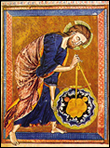The Philosophy of St. Bonaventure On Creation
The Philosophy of st. Bonaventure, 1965
Then appeared the peripatetics, whose master and leader was Aristotle, and whom St. Bonaventure treats with some moderation during the calm period of the Commentary on the Sentences. At this time he is well aware that Aristotle taught the eternity of the world; now, as we shall see more fully later on, he considers that the doctrine of the eternity of the world is extremely hard to reconcile with that of creation; he does not believe then that Aristotle considered matter and form created by God out of nothing, even from all eternity: utrum autem posuerit materiam et formam factam de nihilo, hoc nescio; credo tamen quod non pervenit ad hoc.
Relying upon charitably interpreted texts, St. Bonaventure supposes that Aristotle considered the world as made by God from eternal elements. The philosopher's error was therefore double, since it rested on the eternity of the elements and on ignorance of creation ex nihilo, but it had at least an advantage over Plato in not supposing that matter could ever have existed without its form. The error of Plato, which assumed God, matter and the idea in separation, seemed to him then more objectionable (multo vilior) than that of Aristotelianism which assumed God and a matter eternally perfected by its form: ideo et ipse etiam defecit licet minus quam alii. Later St. Bonaventure expresses harsher opinions about Aristotle, but yet he will never expressly deny that his God without ideas and without providence made the world eternally, of eternally existent matter and form.
So it clearly appears that those who of all philosophers came nearest to the truth yet failed to reach it. Now it is just there, at the precise point at which the skill of philosophers breaks down, that revelation comes to our aid, teaching us that all has been created and that things have been brought into being in the totality of what they are: ubi autem deficit philosophorum peritia, subvenit nobis sacrosancta Scriptura, quae dicit omnia esse creata, et secundum omne quod sunt in esse producta. Thus it is that the reason when better informed perceives and confirms with decisive arguments the truth that Scripture affirms.
For it is certain that the more a productive cause is primary and perfect in the order of being, the more profoundly its action penetrates its effects. In the case where the cause considered is the absolutely primary and perfect being, the action that it exercises must extend its efficacy to the total substance of each of its effects.
In other words, if God produces a thing, He can only produce it integrally, and His action necessarily engenders its constitutive principles, matter and form, at the same time as the compositum. Similarly, the less aid it requires for its action, the more noble and the more perfect is the agent. If then we consider the most perfect agent possible, his action must be completely sufficient in itself and must be exercised without recourse to any external aid. Now the case of God is exactly this; He is then capable, in Himself, of producing things without the help of pre-existing principles. On the other hand, God is perfectly simple; His essence is not divisible into particular beings; He does not extract things from Himself by dissecting His own substance; so He necessarily extracts them from nothing. In the same way, lastly, if God is truly perfect and absolute simplicity, He cannot act in a part of Himself; in each of His actions, it is His whole being that is concerned and comes into play; now the nature of the effect is necessarily proportioned to that of the cause; so just as the action of a being composed of matter and form can engender a form in a matter which is already present, so an absolutely simple being such as God can produce the integral being of a thing. Acting in all His being, His effect can only be being; the natural result then of the divine action is the bringing into existence of that which nothing preceded, except God and the void.
A second problem, and one inseparable from the foregoing, is the question when this integral production of beings can have taken place. The human reason, incapable of discovering with its own resources the true nature of the creative act, is similarly incapable of determining accurately the moment of creation. Either we know that creation consists in producing the very being of things, without employing any pre-existing matter, and so it is obvious that the world was created in time; or, on the contrary, we believe that the creator used in His work principles which were anterior to the world itself, and thus the created universe seems logically eternal. The kernel of St. Bonaventure's argument on this point was always that there is a contradiction in terms in supposing that what is created out of nothing is not created in time. The idea of a universe created by God out of nothing and from all eternity, an idea which St. Thomas Aquinas considered logically possible, seemed to St. Bonaventure so glaring a contradiction that he could not imagine a philosopher so incompetent as to overlook it.
His thought, which he does not develop at length, although he states it with the greatest energy, seems here to follow St. Anselm very closely and to proceed from a vigorously literal interpretation of the formula ex nihilo. The particle ex, in fact, seems to him capable of only two interpretations. Either it designates a matter existing before the divine action, or it simply marks the starting point of this action, implies and establishes a relation of order, fixes an initial term anterior to the appearance of the world itself.
Now the word ex cannot signify a matter, for it here determines the word "nothing," the very significance of which is absence of being, which could not therefore designate a material in which things could be shaped. It can only signify the starting point of the divine action and establish the initial term of a relation of anteriority and posteriority. It follows that to say that the world was created ex nihilo is either to say nothing or to say that the non-existence of the universe preceded the existence of the universe; that before there was nothing of the world and that only afterwards the world appeared; to suppose, in a word, the beginning of things in time and to deny their eternity.
Although this seems to have been the central and decisive argument in St. Bonaventure's eyes, since it makes the eternity of a world created out of nothing seem contradictory, it is presented to us from the time of the Commentary on the Sentences flanked by other arguments of no less historical importance, based on the impossibility of the created infinite. It is easy to prove on this point how inaccurate it is to explain St. Bonaventure's thought by his ignorance of the Aristotelianism of Albert and St. Thomas. For it is with the help of Aristotelian arguments and in opposition to Aristotle himself that he shows the impossibility of a world created from all eternity; better still he expressly refutes the thesis which St. Thomas was to believe supportable; St. Bonaventure therefore is fully aware of the position that he takes up, and he dismisses the teaching of which he is alleged to be ignorant on the ground of maturely considered principles.
In the first place, the eternity of the world contradicts the principle that it is impossible to add to the infinite; for if the world had no beginning, it has already experienced an infinite duration; now every new day which passes adds a unit to the infinite number of days already gone; the eternity of the world supposes therefore an infinite capable of being augmented. If it is objected that this infinite is so only, as it were, at one end, and that the number of days gone, infinite in the past, is finite in the present, nothing substantial is asserted. For it is evident that, if the world is eternal, it has already passed through an infinite number of solar revolutions and also that there are always twelve lunar revolutions to one solar; so that the moon would have accomplished a number of revolutions in excess of the infinite. So, even considering this infinite bounded by the present, and considering it infinite only where it really is so, in the past, we end by supposing a number larger than the infinite, which is absurd.
In the second place, the eternity of the world contradicts the principle that it is impossible to order an infinity of terms. All order, in fact, starts from a beginning, passes through a middle point and reaches an end. If then there is no first term there is no order; now if the duration of the world and therefore the revolutions of the stars had no beginning, their series would have had no first term and they would possess no order, which amounts to saying that in reality they do not in fact form a series and they do not precede or follow one another. But this the order of the days and seasons plainly proves to be false. This argument may seem sophistical from the Aristotelian and Thornist point of view.
If Aristotle declares that it is impossible to order an infinite series of terms, he refers to terms essentially ordered; in other words, he denies that a series of essences can be infinite if it is hierarchically ordered, if its existence or causality is conditioned from top to bottom, but he does not deny that a series of causes or of beings of the same degree can be infinite. For example, there is no progression to the infinite in the ascending series of the causes of local movement in terrestrial bodies, for superior movers are required, requiring in their turn an immobile first mover to account for them, but we can suppose without contradiction that this hierarchical system of moving causes exists and operates from all eternity, the displacement of each body being explained by a finite number of superior causes, but being preceded by an infinite number of causes of the same order. St. Bonaventure is not ignorant of this distinction and, if he does not accept it, it is not because he cannot grasp it, it is because it implies a state of the universe which is incompatible with his profoundest metaphysical tendencies. In St. Bonaventure's Christian universe there is, in reality, no place for Aristotelian accident; his thought shrinks from supposing a series of causes accidentally ordered, that is to say, without order, without law and with its terms following one another at random.
Divine Providence must penetrate the universe down to its smallest details; it does not then account only for causal series, but also for those of succession. The root of the matter is that St. Bonaventure's Christian universe differs from the pagan universe of Aristotle in that it has a history; every celestial revolution, instead of following indifferently an infinity of identical revolutions, coincides with the appearance of unique events, each of which has its place fixed in the grand drama which unfolds itself between the Creation of the world and the Last Judgment. Every day, every hour even, forms part of a series which is ruled by a certain order and of which Divine Providence knows the whole reason; si dicas quod statum ordinis non necesse est ponere nisi in his quae ordinantur secundum ordinem causalitatis, quia in causis necessaria est status, quaero quare non in aliis? St. Bonaventure refuses to admit not only causes but also events accidentally ordered.
The third property of the infinite which is irreconcilable with the eternity of the world is that the infinite cannot be bridged; now if the universe had no beginning, an infinite number of celestial revolutions must have taken place, and therefore the present day could not have been reached. If it is objected, with St. Thomas Aquinas, [1] that to bridge a distance it must be traversed from one extremity to the other, and that, in consequence, one must start from an initial point which in this case is lacking, we shall answer: starting from the present day, we must necessarily be able to fix a day infinitely anterior to it, or else we cannot fix any one; if no anterior day precedes the present day by an infinite duration, then all the anterior days precede it by a finite duration and therefore the duration of the world had a beginning; if, on the contrary, we can fix an anterior day infinitely removed from the present day, we ask whether the day immediately posterior to that one is infinitely removed from the present day or whether it is not. If it is not infinitely removed from it, neither is the preceding one, for the duration which separates them is finite. So if it is infinitely removed from it, we ask the same question about the third day, the fourth, and so on ad infinitum; the present day will not then be further removed from the first than from any of the others, which amounts to saying that one of these days will not precede another, and that they will consequently be all occurring at the same time.
A fourth proposition incompatible with the eternity of the world is that the infinite cannot be understood by a finite faculty. Now to say that the world had no beginning is to say that the finite can understand the infinite. It is generally admitted that God is infinitely powerful and that all else is finite; it will be admitted further, with Aristotle, that every celestial movement implies a finite Intelligence to produce it or, at least, to know it; no doubt it will be allowed, lastly, that a pure Intelligence can forget nothing. If then we suppose that this Intelligence has already determined or simply known an infinity of celestial revolutions, since it has forgotten none of them, it necessarily possesses today the actual knowledge of an infinity of memories. And if it is objected that it can know in a single idea this infinity of celestial revolutions which are all similar to one another, we reply that it does not know these revolutions only, but their effects also, which are diverse and infinite, so that actual knowledge of the infinite must necessarily be attributed to a finite Intelligence.
The fifth and last impossibility which St. Bonaventure brings forward against the eternity of the world is the coexistence of an infinite number of given beings at one and the same time. The world has been made for man, for there is nothing in the universe which is not in some way related to him; it cannot have ever existed therefore without men since it would have had no reason for existing; now man lives only in finite time; if then the world exists from all eternity, there must have existed an infinite number of men. But there are as many rational souls as there are men; therefore there has been an infinity of souls. Now these souls are naturally immortal; if then an infinity of souls has existed, there exists an infinity of them in actuality also, which we have already declared impossible. And the evasions which are attempted in order to escape this error are worse than the error itself. Some suppose metempsychosis, so that a finite number of souls could pass through different bodies during an infinite time, a hypothesis irreconcilable with the principle that each form is the proper and unique act of a determined matter. Others suppose, on the contrary, that a single intellect exists for the whole human race, a still graver confusion, since it involves the suppression of individual souls, of last ends and of immortality.[2]
[1] Thomas Aquinas, Summa theologica, I . 46, 2 , per tot., where St. Bonaventure's arguments are discussed point by point: ad 1 and 2 against his interpretation of ex nihilo; ad 6 against the argument " infinita impossible est pertransiri"; ad 7 against the impossibility of an infinite series of accidentally ordered causes; ad 8 against the actually realized infinity of immortal souls.
[2] This objection seems very strong to St. Thomas Aquinas and he hardly sees how the supporters of the eternity of the world can meet it, unless by supposing that the world has always existed, like the unchangeable bodies or the eternal Intelligences, but unlike corruptible beings such as the human species. Cf. Summa theologica, ad 8.
E. Gilson, The Philosophy of St. Bonaventure (New York: St. Anthony Guild Press, 1965), pp. 169-176.





